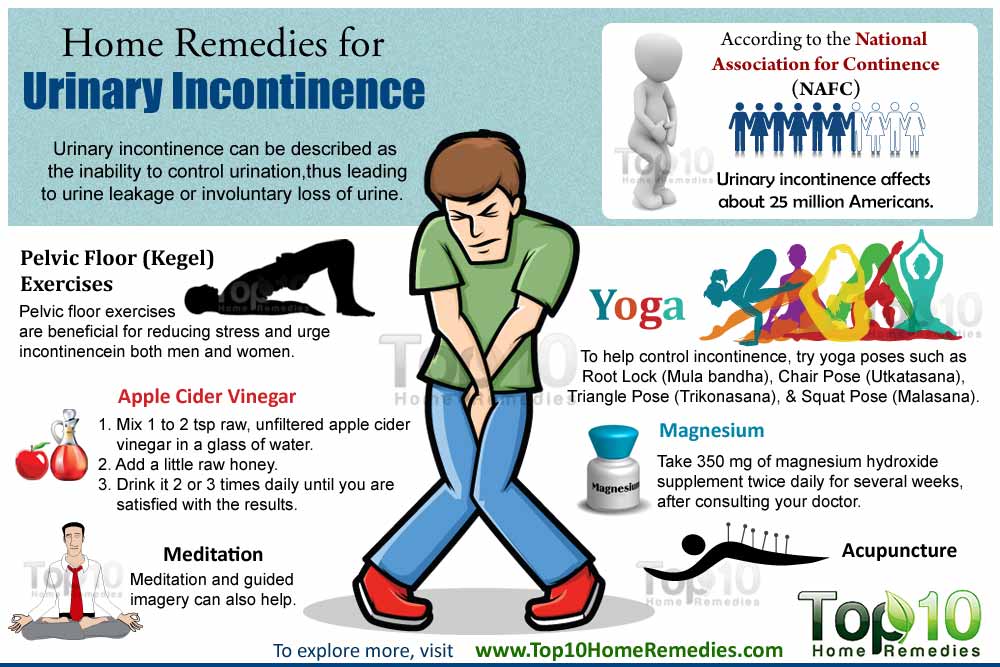Medications for urinary incontinence, such as oxybutynin, trospium chloride, or estrogen, may be prescribed by your doctor, as they help reduce bladder contractions or improve urethral sphincter action, decreasing episodes of involuntary urine leakage.
Urinary incontinence is a common condition that can affect anyone, especially women over 45 years of age, and causes uncomfortable symptoms such as leakage of urine on clothes, which may arise after exertion or after a sudden urge to urinate, and may occur in small or large amount. Better understand the symptoms, types and causes of urinary incontinence.
Medicines for urinary incontinence should only be used with medical indication, when other forms of treatment, such as physical therapy exercises, were not enough to control symptoms. In addition, these medicines have contraindications and should not be used during pregnancy or by people who have glaucoma, for example, and they can cause side effects such as dry mouth, dizziness, diarrhea or even urinary retention.
Medications for the treatment of urinary incontinence that may be prescribed by the doctor include:
1. Mirabegron
Mirabegron is a drug indicated for the treatment of urge urinary incontinence in adults, when there is an urgent and uncontrollable urge to urinate, especially related to overactive bladder syndrome. Understand what overactive bladder syndrome is.
This remedy works by relaxing the bladder muscle, improving the bladder’s ability to store urine, as well as increasing the amount of urine passed each time you go to the bathroom, helping to empty the bladder completely.
Mirabegron can be found in pharmacies or drugstores in the form of tablets, under the trade name Myrbetric, and must be used with medical indication.
2. Oxybutynin
Oxybutynin is a remedy for urinary incontinence that has a direct effect on the bladder muscles, increasing its storage capacity, being indicated for adults with difficulty holding urine, urinary urgency or neurogenic bladder.
In addition, oxybutynin is also indicated for the treatment of nocturnal enuresis in children over 5 years of age, and should only be used when indicated by a pediatrician.
This remedy can be found in the form of tablets or syrup, sold in pharmacies or drugstores under the trade names Retemic, Nourin or Dry. See how to use oxybutynin.
3. Darifenacin hydrobromide
Darifenacin hydrobromide is a medication for urinary incontinence indicated for the treatment of overactive bladder that causes an urgent urge to urinate and/or the need to urinate frequently.
This medicine works by relaxing the bladder muscles and increasing the storage capacity of urine in the bladder, which reduces involuntary loss of urine.
Darifenacin hydrobromide is sold in pharmacies or drugstores in the form of tablets, under the trade name Fenazic, indicated only for adults over 18 years of age.
4. Solifenacin Succinate
Solifenacin succinate is indicated for urge incontinence or overactive bladder in adults over 18 years of age, as it helps to relax the bladder muscle, decreasing its contractions that can lead to involuntary loss of urine.
Solifenacin succinate is sold in pharmacies or drugstores, in the form of tablets, under the trade name Vesicare.
5. Imipramine
Imipramine is a type of antidepressant that may be indicated for the treatment of urge urinary incontinence or overactive bladder in adults, as it is able to decrease bladder contraction and increase urethral resistance, reducing urine loss.
This drug can be found under the trade names Tofranil or Imipra, for example, sold only with a doctor’s prescription and withholding of the prescription by the pharmacy. Learn how to take imipramine.
6. Trospium chloride
Trospium chloride is an antispasmodic of the urinary tract, indicated in the treatment of urge urinary incontinence, overactive or irritable bladder, as it acts by decreasing involuntary bladder contraction and improving the action of the urethral sphincter, reducing urine loss.
This medicine must be used with medical advice, by adults over 18 years of age, and can be found in the form of tablets under the trade name Spasmoplex. Learn how to use trospium chloride.
7. Tamsulosin
Tamsulosin is a drug indicated for the treatment of urge urinary incontinence in men with benign prostatic hyperplasia, as it helps to relax the bladder and prostate muscles, thus improving urinary flow and facilitating bladder emptying.
This medicine must be used with medical advice and can be found in pharmacies or drugstores in the form of tablets or capsules, as the generic “tamsulosin hydrochloride” or under the trade names Secotex, Tansudart, Tamsulom or Stub, for example. See how to use tamsulosin.
8. Estrogen
Estrogen, such as estradiol in the form of an ointment, patch or vaginal ring, may be indicated for urinary incontinence in menopausal women, as it acts by increasing urethral closing pressure, blood flow and the quality of the tissue that lines the urethra and vagina, reducing the chances of incontinence.
Urinary incontinence in menopause happens due to the decrease in estrogen production during this period and the use of estrogen should only be done with the indication of the gynecologist. See other ways to treat menopausal urinary tract infection.
